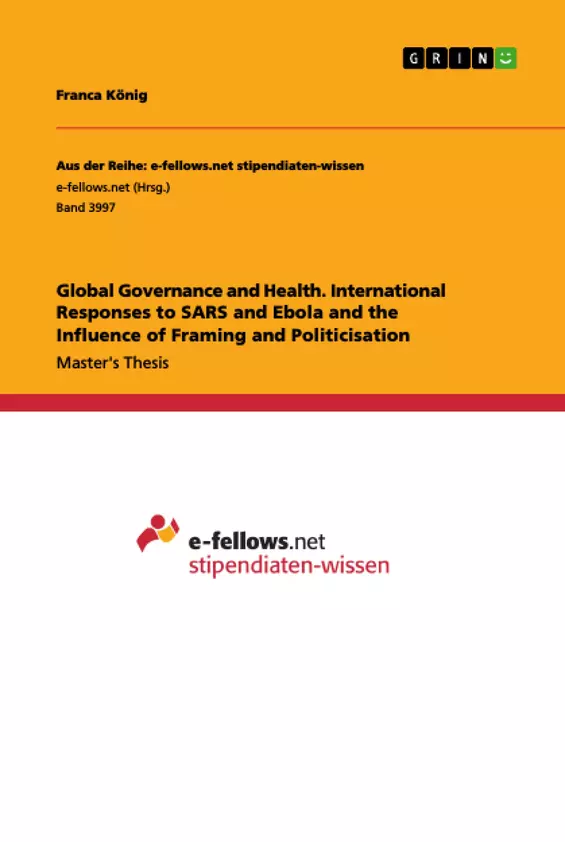The paper asserts that politicisation and framing can offer a valid explanation for Global Governance in pandemic crises, and accordingly investigates how both affected the international responses to SARS and Ebola. The author argues that—even in the allegedly rational scientific field of health—policymakers engage in framing in order to cope with uncertainty of international crises through categorising epidemic outbreaks and prescribing a particular course of action. Tracing the evolution of both epidemics, the paper identifies five frames, namely "securitisation of medicine", "medicalisation of insecurity", economics, human rights and development.
The author holds that they significantly impacted the sense-making phase of the evolving epidemics and thereby determined the extent or lack of collective response. In the face of uncertainty of pandemic crisis, the triangular relationship between policymakers, the public sphere and accountability can offer a more elaborate account of crisis management and collective action, as political frames become important as sense-making vehicles within broader global governance processes and can best explain policy responses.
Under the WHO six-phased classification scheme, both the 2003 SARS epidemic and the 2014 Ebola epidemic qualified as phase five and thereby should have triggered comparable immediate international containment efforts. The divergent outcomes—effective collective response in the case of SARS and crisis protraction with regards to Ebola—are therefore especially striking. Whereas SARS remained limited to around 700 deaths, Ebola had already killed more than 1,400 people by the time that the WHO first acknowledged the epidemic.
Inhaltsverzeichnis (Table of Contents)
- Introduction
- Global Governance and Health
- The Politics of Crisis, the Public Sphere and Accountability Ties
- Pandemics and Framing: A Matter of Medicine or Security?
- Methods
- Pandemic Crises Revisited
- The 2003 SARS Outbreak
- The 2014 Ebola Outbreak
- Conclusion and Discussion
Zielsetzung und Themenschwerpunkte (Objectives and Key Themes)
This dissertation examines the complexities of collective response to global health crises, focusing on the role of competing frames, the public sphere, and the international community's capacity to act effectively. The study analyzes the 2003 SARS and 2014 Ebola outbreaks as case studies to illustrate the dynamics of crisis response and the impact of framing on the effectiveness of international governance.
- The influence of competing frames in shaping public perceptions and policy responses to global health crises.
- The role of the public sphere in shaping public discourse and influencing international action.
- The challenges and opportunities for accountability and transparency in global health governance.
- The complexities of coordinating international responses to pandemic threats.
- The interplay between security and health perspectives in framing pandemic crises.
Zusammenfassung der Kapitel (Chapter Summaries)
The introduction sets the stage by highlighting the importance of global health governance in a world increasingly threatened by infectious diseases. It contrasts the contrasting responses to the 2003 SARS and 2014 Ebola outbreaks, raising questions about the factors that shape international action in times of crisis.
Chapter 2 delves into the theoretical framework underpinning the research, exploring the complexities of global health governance, the dynamics of crisis politics, and the role of public accountability in shaping international responses.
Chapter 3 outlines the methodological approach employed in the dissertation, providing a clear rationale for the chosen methods and their suitability for addressing the research questions.
Chapter 4 examines the two case studies – the 2003 SARS and 2014 Ebola outbreaks – analyzing the specific frames that emerged during each crisis, their influence on public discourse and decision-making, and the impact on the effectiveness of international response.
Schlüsselwörter (Keywords)
This research focuses on the interplay of competing frames, the public sphere, and global health governance in the context of pandemic crises. The key concepts explored include international health regulations, crisis management, pandemic preparedness, public perceptions, international cooperation, and the impact of framing on policy decisions.
Frequently Asked Questions
How does framing influence global health governance?
Framing allows policymakers to cope with uncertainty by categorizing epidemic outbreaks and prescribing specific courses of action, which determines the extent of the collective international response.
What are the five key frames identified in the study of SARS and Ebola?
The identified frames are: securitisation of medicine, medicalisation of insecurity, economics, human rights, and development.
Why was the international response to SARS more effective than the response to Ebola?
The study suggests that divergent outcomes resulted from different politicisation and framing processes, leading to immediate containment for SARS while the Ebola crisis was protracted.
What role does the public sphere play in pandemic crisis management?
The public sphere, along with accountability ties and policymakers, forms a triangular relationship that shapes the sense-making phase of an epidemic and influences collective action.
What is the significance of the WHO six-phased classification scheme?
Both SARS and Ebola reached phase five, which should have triggered comparable international efforts, yet the actual policy responses differed significantly due to political framing.
- Citar trabajo
- Franca König (Autor), 2015, Global Governance and Health. International Responses to SARS and Ebola and the Influence of Framing and Politicisation, Múnich, GRIN Verlag, https://www.grin.com/document/1148159



